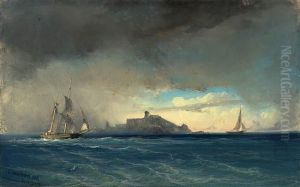V. Couadouan Paintings
Victor Couadouan, also known as V. Couadouan, was a 19th-century French painter and lithographer born in 1810. Though not as widely recognized as some of his contemporaries, Couadouan was a skilled artist who contributed to the French art scene during a period that bridged the Romantic and Impressionist movements.
Couadouan initially trained as a lithographer, which was a popular form of printmaking at the time, allowing for the mass production of artworks. His early works demonstrate a strong graphic quality and attention to detail that is characteristic of lithography. However, he eventually expanded his repertoire to include painting, focusing on landscapes, urban scenes, and genre paintings, which depict scenes of everyday life.
Throughout his career, Couadouan exhibited his works at the Paris Salon, which was the official art exhibition of the Académie des Beaux-Arts in Paris. Participation in the Salon was considered essential for any artist seeking recognition and success in France. Although Couadouan's work did not revolutionize the art world, his contributions were solid representations of the artistic trends of his time.
Victor Couadouan passed away in 1877. While his work may not have garnered the same level of fame as that of his peers, his paintings and lithographs remain as a testament to the skills and aesthetic sensibilities of a professional 19th-century French artist. His works are part of various collections and continue to be studied by those interested in the period's art history.
